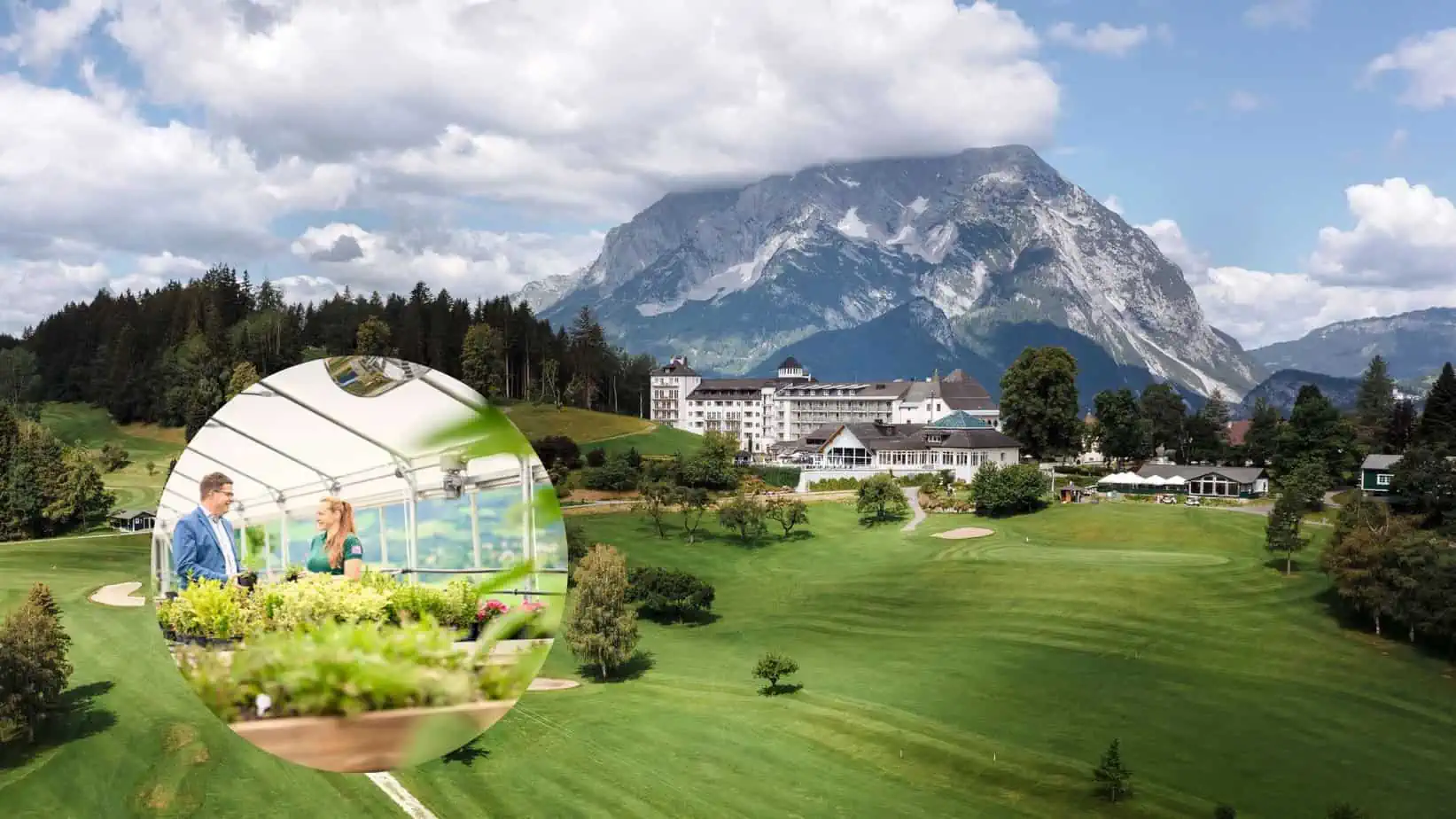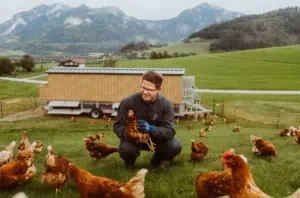Golfresort Schloss Pichlarn focuses on sustainable transformation
The buzzwords that characterize the topic of sustainability in golf tourism are clear: CO₂ neutrality is part of it, regionality in gastronomy, sustainable water management. Ideally, everything is documented by a seal, of which there are now countless in tourism. In a country like Austria, whose approximately 160 golf courses live to a considerable extent from guests, the topic of sustainability becomes more present. This is also because golf course operators witnessed the discussion about CO₂ neutrality and the environmental compatibility of their ski resorts last winter. After all, many an operator of a golf course in the Zillertal or in Kitzbühel is also in the ski business. Summer and winter tourism are closely intertwined in many regions. So the question of how environmentally friendly a hotel or golf facility is operated is getting closer.
Metamorphosis of a traditional hotel
Schloss Pichlarn, one of Austria’s great traditional hotels, has taken up the challenge. The 5-star hotel, which has been part of Imlauer Hotels since 2021, has undergone a minor metamorphosis since the change of ownership. According to the operators, the future viability of the facility with its 18-hole course, its own drinking water sources and the hotel depends on sustainable operation.
The strategy pursued by the company is not limited to the large, quickly visible elements that make sense from a marketing point of view. The e-charging station in front of the hotel entrance, for example, or the advice to refrain from frequent towel washing in the room, for example.
Instead, during our visit to the site, we look at a large area with chickens that has found a place below the castle-like hotel ensemble. “A chicken like that is pretty smart, and it’s pretty curious.” The chicken that Christian Seiringer, the hotel’s property manager, is talking about is currently cavorting here with its approximately 250 fellow species. Seiringer actually never had much interest in chickens until hotelier Georg Imlauer, owner of Schloss Pichlarn, explained. “The Seiringer, he now also makes the chickens”.
What sounds like a funny detail is in fact the origin story to a chicken farm that now produces 70,000 eggs a year and is representative of the reorientation of the resort.
Conversion to pesticide-free operation
“We want to become a feel-good place,” explains Christian Kresse, once managing director of Carinthia Advertising and now a freelance consultant, referring to the golf resort. The project excites the marketing expert, who is also an avid golfer. Already on the phone he told about the idea of climate neutrality, the complete conversion of the golf course to pesticide-free operation, energy self-sufficiency and other positive developments in a house that for decades has stood for top Austrian hotel business.
Certificate offsetting is not an issue
Seiringer is primarily involved with the implementation, planning and financing of the process. He is quick to explain that he cannot use the term climate neutrality. “After all, we would only achieve climate neutrality if we offset the Co2 footprint via certificates,” he sums up. “That actually misses our intent.” That is, first of all, to minimize the footprint of the plant. “First of all, we want to get better.”
In this way, he enters into an international debate about the problem of greenwashing, which also affects tourism: What does sustainability mean, which area is pursued most intensively, what is the goal?
Schloss Pichlarn has already recognized how complex the topic of sustainability has become. There is hardly an area of the resort that is not affected. The first all-electric green mower is already in the garage. In greenkeeping, as with all garden equipment around the hotel in the future, the company relies on complete electrification, the basis of which is its own photovoltaic system. It now sits on the roofs of the tennis halls and on the edge of the golf course and currently supplies 365 kwh. In summer, you cover half of the required energy demand every day.
The power supply is also relevant for the golf course’s sprinkler system, which was completely renewed during the winter. New sprinklers provide distribution accuracy, a separate storage pond for their supply. At the same time, Schloss Pichlarn has its own drinking water sources, which provide a relatively unlimited supply of water for the time being. But distributing drinking water uncontrollably on a golf course, no that is no longer in keeping with the times, Seiringer explains. Saving water, collecting water – these are the solutions for him.
First investments – then cost savings
The challenge is to explain it to the hotel client, the golfer, the guests. “Basically, the guests all react very positively,” notes Bernadette Leitner, Marketing & Communications Manager. Especially the strong emphasis on regional sourcing of food or short supply chains met with positive feedback. This may also be due to the fact that the concept of sustainability becomes tangible here. The new greenhouse, with an area of 300 square meters, in which all kinds of greens, from sprouts to various herbs, are grown for the own use of the various Imlau hotels, is located directly next to the tennis hall and not far from the hotel and clubhouse. Two gardeners have been hired especially for this purpose. This is also one aspect of sustainability, explains Seiringer. Whether it’s chicken, honey or parsley, “first of all, someone has to take care of it.” Also on holidays. The investment in time and personnel is initially higher, but in the second step costs are also saved. The 70,000 eggs were eventually bought in earlier.
In the discussion with those responsible for the changeover process, it becomes clear that long-term decisions are at stake here. Sustainability, whether in hotels, restaurants or greenkeeping, also means a bit of a headache for those involved. The plastic bottles in the hotel bathrooms, for example, could not yet be replaced in Schloss Pichlarn. No innovation could convince across the board, which, by the way, also includes the economic approach. In the end, a sustainable golf course or hotel must also be profitable in order to be considered in the market. But Bernadette Leitner has recognized the problem of plastic bath products. And of course, one or two guests come forward to point out that a sustainability program would be difficult to reconcile with this.
Success is the result of detailed work
Transforming a golf facility or resort into a sustainable or more climate-friendly operation is a process of small steps. Since this year, Schloss Pichlarn has also been working on certification with the Austrian Ecolabel, which is considered very strict. Christian Seiringer stands in the cellar vault by the trash in Pichlarn Castle and points to a free space. “Here comes the new composter .” The device converts kitchen waste into humus within a few hours. “This is our next purchase. It just makes sense.” After all, the compost could find use in the gardens, by the greenhouse and on the golf course in the shortest possible time. 4.5 tons of kitchen waste are generated annually at the hotel. In the future, they will be part of a circular economy.
Marketing expert Christian Kresse thinks it’s wonderful, and would love to start every single one of the sustainability projects at Schloss Pichlarn right away. “We’re tackling this,” he says. Seiringer nods. Still. Together, they find a viable path. The sustainability project cannot succeed otherwise.
https://golfsustainable.com/en/__trashed/








